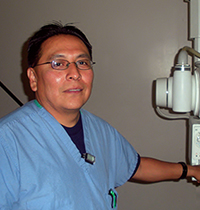 Why did you choose your specific health professional career?
Why did you choose your specific health professional career?
I really didn’t know what I wanted to do as a career until my brother-in-law, Clarence Myron, introduced me to radiology and all the great opportunities it provided. I will always give him credit for steering me in this direction. Currently, he is a sonographer at Hopi Health Care Center and has been a wonderful role model for a great part of my life.
What experiences did you have to make sure this profession was right for you?
I remember getting an X-ray of my ankle one time. It was a very interesting process to watch the technologists go about their duties. I also thought about the economy. I figured that no matter how bad our economy may get, there will always be a need for health care professionals. With this thought in mind, I figured radiology would be a secure profession, and so far, it has been a very rewarding career.
Describe any obstacles or barriers to success that you encountered along your health professional career path. How did you overcome them?
The biggest challenge for me was leaving my family, my village, and the reservation to attend college in a major city. I think this is a challenge that a lot of Native students face. There is also the adjustment to the fast pace of city life and culture shock for many students. Luckily, I was able to overcome this obstacle by looking at the bigger picture. I knew getting a college education was something I really needed to accomplish in order to succeed in my life. It was just a matter of being patient and dealing with one barrier at a time. A strong support system can make a huge difference, and I am forever thankful to my family for standing beside me for many years.
What do you do in your current job?
In my current job, I provide X-ray and computed tomography (CT) services for the Hopi community. Thanks to our current supervisor, Marjorie Chinnock, I have been given the opportunity to learn Magnetic Resonance Imaging (MRI) as well.
What advice do you have for American Indian/Alaska Native students who are interested in health careers?
Take some time to shadow someone in your field of interest and see if that particular health profession is something you really want to do. Be sure to check out several areas and don’t limit yourself. It is important to keep other doors of opportunity open. Always remember that at the end of the day, it’s all about providing quality patient care.
What would you like to see for your tribe’s future?
I would like to see my tribe be healthy and happy. I would also like to see the Hopi Health Care Center increase its services for our patients by expanding the in-patient unit, for example, by providing surgical procedures, etc. By offering more services, our patients can avoid the burden of having to travel a great distance for some of these services.
Do you practice traditional medicine? If you do, then how does traditional medicine interact with conventional medicine?
Yes, I do. It is our way of life as Hopi people, and without it, we lose part of our identity. As for western medicine, I don’t think it addresses every aspect of a patient. Traditional medicine is able to provide spiritual healing, which is often a missing component in western medicine.

